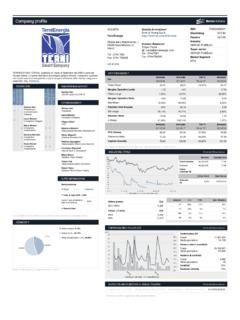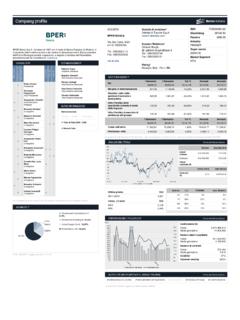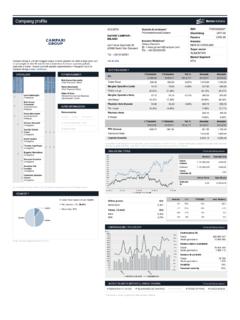Transcription of CORPORATE GOVERNANCE CODE - borsaitaliana.it
1 CORPORATE GOVERNANCE Committee CORPORATE GOVERNANCE CODE July 2015 TRANSLATION FOR REFERENCE PURPOSES ONLY 2 2015 Comitato per la CORPORATE GOVERNANCE All rights reserved. No part of this document may be reproduced or transmitted in any form or by any means, electronic or mechanical, including photocopying, recording, or any information storage or retrieve system without prior permission from the copyright owners. 3 INDEX Main Principles and temporary regime Article 1 Role of the Board of Directors Article 2 Composition of the Board of Directors Article 3 Independent directors Article 4 Internal committees of the Board of Directors Article 5 Appointment of directors Article 6 Remuneration of directors Article 7 Internal control and risk management system Article 8 Statutory auditors Article 9 Relations with the shareholders Article 10 Two-tier and one-tier systems 4 Main Principles and temporary regime I.
2 Adoption of and compliance with this CORPORATE GOVERNANCE Code (the Code ) is voluntary. II. Each article of the Code is divided into principles, criteria and a comment. The criteria set out the recommended conduct typically necessary in order to reach the objectives set out in the principles. Comments instead pursue two goals: i) clarification, also through examples, of the relevant principles and criteria; ii) description of additional positive conduct, intended as possible desirable methods to pursue the objectives set out in the principles and criteria. III. Each Italian company with listed shares (the issuer ) adopting the Code shall provide in its CORPORATE GOVERNANCE report and proprietary shareholdings ( CORPORATE GOVERNANCE Report ) accurate, concise, exhaustive and easily understandable information on the manner through which each single recommendation contained in the principles and criteria has been effectively implemented during the period covered by the report.
3 IV. Consistent with the EU Recommendation n. 208/2014, issuers clearly state in their CORPORATE GOVERNANCE Report which specific recommendations, laid down in principles and criteria, they have departed from and, for each departure: (a) explain in what manner the company has departed from a recommendation; (b) describe the reasons for the departure, avoiding vague and formalistic expressions; (c) describe how the decision to depart from the recommendation was taken within the company; (d) where the departure is limited in time, explain when the company envisages complying with a particular recommendation.
4 (e) if it is the case, describe the measure taken as an alternative to the relevant non-complied recommendations and explain how such alternative measure achieves the underlying objective of the recommendation or clarify how it contributes to their good CORPORATE GOVERNANCE . As for the principles and criteria aimed at providing definitions, unless otherwise indicated and explained by the issuer, the issuer is supposed to be in compliance with them. The Code framework patterned after the principle of flexibility allows issuers not to comply, in whole or in part, with some of its recommendations. In line with the comply or explain principle, explicitly set out in art.
5 123-bis of the legislative decree no. 58/1998 (hereinafter CLF), issuers must, however, explain the reasons of each non-compliance: the Committee believes that the decision not to comply with some Code s recommendations does not involve a negative evaluation a priori, being aware of the fact that this may be contingent on several factors: the company may not have reached the structure that allows 5the full implementation of all recommendations ( in case of a recently listed company) or it may evaluate that some recommendations are less useful for/incompatible with their CORPORATE GOVERNANCE model or with the legal and financial features of the company, or, otherwise, it might have adopted other GOVERNANCE solutions, as an alternative to the non-complied recommendation, which enable the company to reach the same underlying objective.
6 V. In case of either laws or regulations that are inconsistent with certain recommendations of this Code, no information is required on the omitted or partial implementation of such recommendations. VI. For the purposes of this Code, an issuer is deemed to belong to the FTSE-Mib index if its shares were included in the list of such an index (or of an index that might replace it in the future) in the last trading day of the fiscal year before the fiscal year covered by the CORPORATE GOVERNANCE Report. VII. The CORPORATE GOVERNANCE Committee (the Committee ) shall monitor the implementation of this Code by the issuers and the development of the related regulatory framework as well as ensure that the Code is in line with the relevant regulatory framework and best practices; for this purposes, the Committee shall consider, usually every two years, whether to update the Code.
7 ** VIII. This Code, as approved by the CORPORATE GOVERNANCE Committee in March 2006, was amended in March 2010, by replacing article 7 (now article 6), and was updated in December 2011, July 2014 and July 2015. IX. Issuers are invited to implement the criterion , f) to the new remuneration policy approved as of January 1st, 2015. Issuers are invited to implement the amendments to the Code approved in July 2015 by the end of the fiscal year beginning in 2016, by giving information to the market in the CORPORATE GOVERNANCE Report to be published during the following fiscal year.
8 As far as the amendments to article 8 are concerned, issuers are invited to implement such changes starting from the first renewal of the Board of statutory auditors taking place after the fiscal year beginning in 2015. 6 Article 1 - Role of the Board of Directors Principles Listed companies are governed by a Board of Directors that meets at regular intervals, adopts an organisation and a modus operandi which enable it to perform its functions in an effective manner. The directors act and make decisions with full knowledge of the facts and autonomously pursuing and placing priority on the objective of creating value for the shareholders over a medium-long term period.
9 Criteria The Board of Directors shall: a) examine and approve the strategic, operational and financial plans of both the issuer and the CORPORATE group it heads, monitoring periodically the related implementation; it defines the issuer s CORPORATE GOVERNANCE and the relevant group structure; b) define the risk profile, both as to nature and level of risks, in a manner consistent with the issuer s strategic objectives, taking into account any risk that may affect the sustainability of the issuer s business in a medium-long term perspective; c) evaluate the adequacy of the organizational, administrative and accounting structure of the issuer as well as of its strategically significant subsidiaries in particular with regard to the internal control system and risk management; d) specify the frequency, in any case no less than once every three months, with which the delegated bodies must report to the Board on the activities performed in the exercise of the powers delegated to them.
10 E) evaluate the general performance of the company, paying particular attention to the information received from the delegated bodies and periodically comparing the results achieved with those planned; f) resolve upon transactions to be carried out by the issuer or its controlled companies having a significant impact on the issuer s strategies, profitability, assets and liabilities or financial position; to this end, the Board shall establish general criteria for identifying the material transactions; g) perform at least annually an evaluation of the performance of the Board of Directors and its committees, as well as their size and composition, taking into account the professional competence, experience, (including managerial experience) gender of its members and number of years as 7director.














